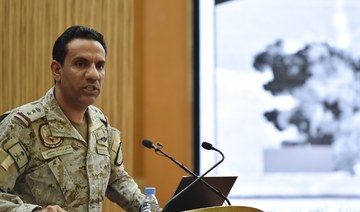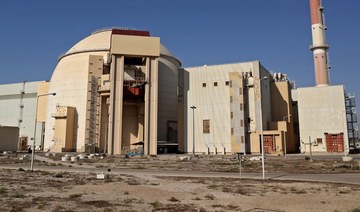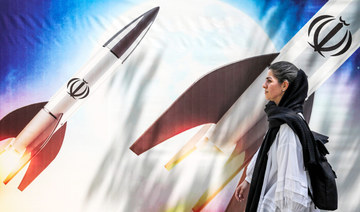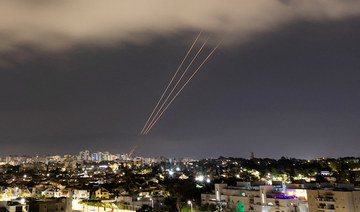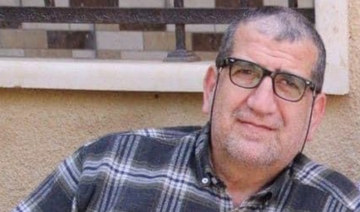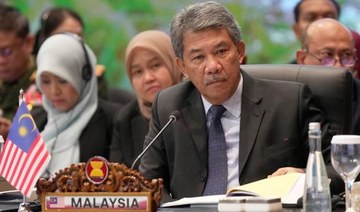NEW YORK: The UN Security Council has imposed sanctions on a top Houthi security official in the Yemeni city of Sanaa, citing his prominent role in intimidations, systematic arrests, detentions, torture, sexual violence “and rape against politically active women.”
A resolution adopted by a vote of 14-0, with Russia abstaining, said Sultan Saleh Aida Aida Zabin, director of the Criminal Investigation Department in Sanaa, was directly or by virtue of his authority responsible for using multiple places of detention including police stations, prisons and detention centers for human rights abuses.
“In these sites, women, including at least one minor, were forcibly disappeared, repeatedly interrogated, raped, tortured, denied timely medical treatment and subjected to forced labor,” the council said in imposing a travel ban and arms embargo. “Zabin himself directly inflicted torture in some cases.”
It added that Zabin “engaged in acts that threaten the peace, security and stability of Yemen, including violations of applicable international humanitarian law and human rights abuses in Yemen.”
Resolution 2564 strongly condemned “violations of International Humanitarian Law and International Human Rights Law, as well as human rights abuses, including those involving conflict-related sexual violence in Houthi-controlled areas and recruitment and use of children in armed conflict across Yemen, as recorded in the Panel of Experts’ final report.”
The council welcomed the formation of the new cabinet of Yemen’s government under the provisions of the Riyadh Agreement, calling “for the full implementation of the Riyadh Agreement (and) calling for the swift resumption of talks between the parties, in full engagement with UN mediation efforts.”
Council members also condemned “in the strongest terms” last year’s attack on Aden that killed 27 civilians, including a Yemeni deputy minister and three humanitarian and health personnel.
The council strongly condemned the ongoing escalation of violence in Yemen’s oil-rich central province of Marib between the Houthis and government forces, and the continuation of Houthi attacks on Saudi Arabia.
The resolution stressed the need “for de-escalation across Yemen and a nationwide cease-fire.”
Regarding the imminent disaster posed by the Houthis’ refusal to allow a UN inspection of the Safer oil tanker, which has been moored off the war-torn country’s coast and is loaded with more than a million barrels of crude oil at risk of leaking, council members emphasized the environmental and humanitarian risk and “the need, without delay, for access of UN officials to inspect and maintain (the) tanker, which is located in the Houthi-controlled north of Yemen.”
They stressed the militia’s responsibility for the situation and for not responding to this “major environmental and humanitarian risk,” underscoring the need for the Houthis “to urgently facilitate unconditional and safe access for UN experts to conduct an assessment and repair mission without further delay.”
Meanwhile US President Joe Biden, during a phone call with King Salman, commended Saudi Arabia’s support for UN efforts to reach a truce and cease-fire in Yemen.
King Salman said Saudi Arabia was keen to reach a comprehensive political solution in Yemen and to achieve security and development for its people.
The two sides discussed Iran’s behavior in the region, its destabilizing activities and its support for terrorist groups.
The Arab coalition thwarted a second Houthi attack on Saudi Arabia just hours after it had destroyed a drone launched by the militia toward Khamis Mushait.
The Organization of Islamic Cooperation condemned the militia’s attempt to target civilians in Saudi Arabia.
Heavy fighting between rebels and government forces in Marib has killed at least 27 people, tribal leaders and security officials said on Friday.
(With AP)
UN Security Council sanctions top Houthi security official for rape and torture
https://arab.news/bmp8s
UN Security Council sanctions top Houthi security official for rape and torture
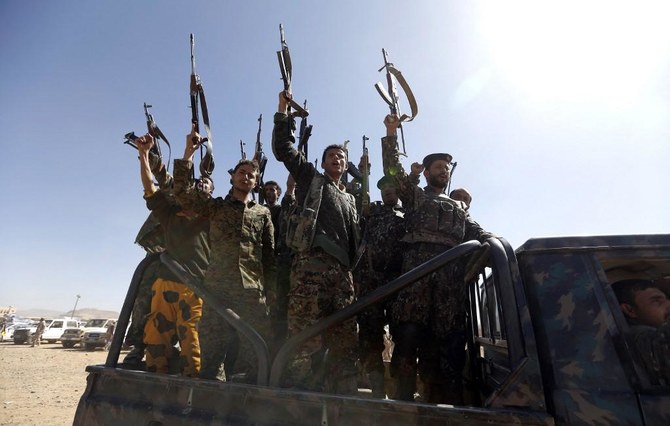
- Sultan Saleh Aida Aida Zabin's acts “threaten peace of Yemen”
- “Zabin himself directly inflicted torture in some cases,” the council said
Israel’s old Lebanese allies grapple with new Hezbollah threat
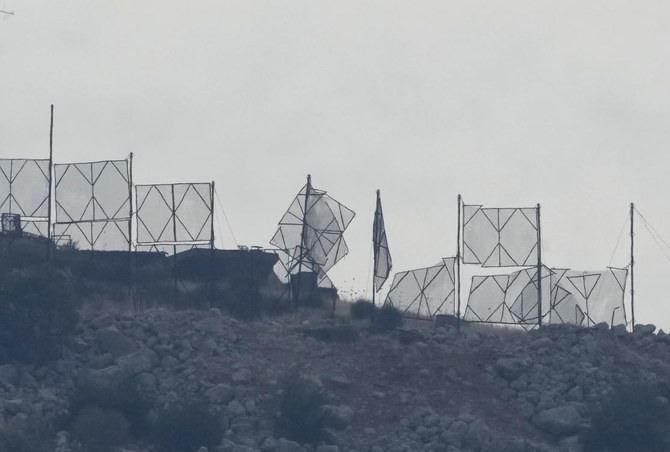
The South Lebanon Army was a mostly Christian militia recruited by Israel when it occupied south Lebanon in the 1980s and 1990s.
The Zadalnikim, as the SLA’s former members are known in Israel from the group’s Hebrew acronym, sought shelter south of the border in the aftermath of Israel’s sudden withdrawal from Lebanon in May 2000, fearing reprisals from Hezbollah, whom they had fought for years in a brutal and uncompromising conflict.
Iran-backed Hezbollah — a Hamas ally with a large arsenal of rockets and missiles — has exchanged fire with Israeli forces almost daily since Hamas attacked Israel on October 7 triggering war in Gaza.
In response, Israel has carried out strikes deeper and deeper into Lebanese territory, targeting several Hezbollah commanders.
A strip several kilometers (miles) wide on either side of the border has become a de facto war zone, emptied of its tens of thousands of civilian residents.
“They told us to prepare for two weeks in a hotel in Tiberias” in northern Israel, said Claude Ibrahim, one of Israel’s more prominent Lebanese collaborators.
“It’s already been six months. I hope it won’t last 24 years,” he told AFP, referring to his exile from Lebanon.
Ibrahim, a former right-hand man of the late SLA commander Antoine Lahad, was evacuated from the northern Israeli town of Kiryat Shmona, near the Lebanese border, in October when the entire city was emptied.
“It’s as if history repeated itself... generation after generation,” he said, referring to how the Zadalnikim had to flee their homeland after years spent moving from village to village during the Lebanese civil war of the 1970s and 1980s.
Of the 6,000 to 7,000 Lebanese who fled to Israel in May 2000, around 3,500 still live in Israel, according to the authorities. They are registered with the interior ministry as “Lebanese of Israel” and were granted citizenship in 2004.
Shortly after their arrival in Israel — where authorities only partly took responsibility for them — many moved on to Sweden, Germany or Canada. Others returned to Lebanon, where they were tried for collaboration with Israel.
All former SLA members in Israel have relatives in Lebanon, mostly in villages in the south, a few kilometers (miles) from the Israeli border.
Few agreed to be interviewed out of fear of reprisals against their families in Lebanon, whom they stay in touch with via third parties for the same reason.
Maryam Younnes, a 28-year-old communications student at Bar-Ilan University near Tel Aviv, was five when she arrived in Israel with her parents.
When her father, a former SLA officer, died a decade ago, they were able to bury him in their ancestral village of Debel, roughly 10 kilometers (six miles) as the crow flies from Ma’alot-Tarshiha, the northern Israeli town they moved to.
The rest of their family remained in Lebanon, in Debel and the capital Beirut.
With fears growing that the near-daily exchanges of fire across the border might escalate into a full-scale war, Younnes was worried about her relatives.
“I’m very concerned for my family, for my village (in Lebanon),” said Younnes, who sees herself as “half Lebanese, half Israeli.”
“I hope that there will be a way to protect them,” she said, if there is an all-out war with Hezbollah.
Ibrahim was equally worried, although he voiced hope that a new conflict with Israel would “finish off” his old enemy Hezbollah.
“The only solution is a big strike on Hezbollah so that it understands that there is no way forward but through peace,” he said.
Ibrahim said there was no reason Israel and Lebanon should not be at peace.
But Asher Kaufman, a history professor at Notre Dame University in Indiana who specializes in Lebanon and the wider Middle East, said attitudes in Israel had shifted significantly in the decades since the civil war and the cooperation between Lebanese Christian militias and the Israeli military.
The vision of an alliance between “Lebanese Christians and the Israelis, which was at the root of the 1982 invasion (of Lebanon by Israel) has completely collapsed.”
Israel has stopped “viewing Lebanon as the Switzerland of the Middle East,” a peaceful and prosperous country, and now sees it as “a violent quagmire it wants nothing to do with.”
Israeli forces must halt ‘active participation’ in settler attacks on Palestinians: UN
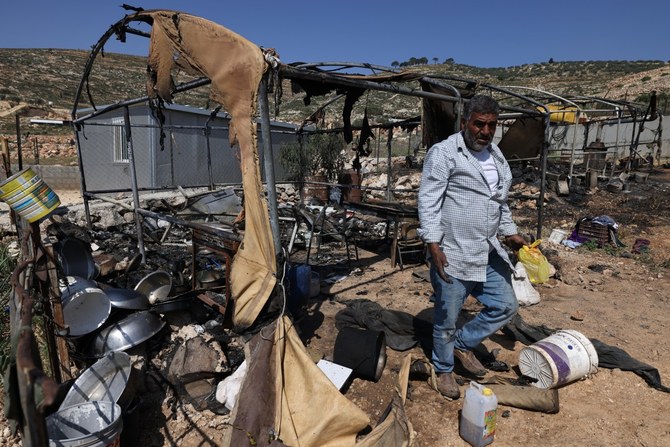
- Israel is still imposing “unlawful” restrictions on humanitarian relief for Gaz
Geneva: The UN voiced grave concern Tuesday over escalating violence in the West Bank, demanding that Israeli security forces “immediately end their active participation in and support for settler attacks” on Palestinians there.
“Israeli authorities must instead prevent further attacks, including by bringing those responsible to account,” Ravina Shamdasani, spokeswoman for the United Nations rights office, told reporters in Geneva.
Israel is still imposing “unlawful” restrictions on humanitarian relief for Gaza, the UN rights office said on Tuesday. “Israel continues to impose unlawful restrictions on the entry and distribution of humanitarian assistance, and to carry out widespread destruction of civilian infrastructure,” said Ravina Shamdasani, spokesperson for the UN human rights office, at a press briefing in Geneva.
Heavy rains lash UAE and surrounding nations as the death toll in Oman flooding rises to 18
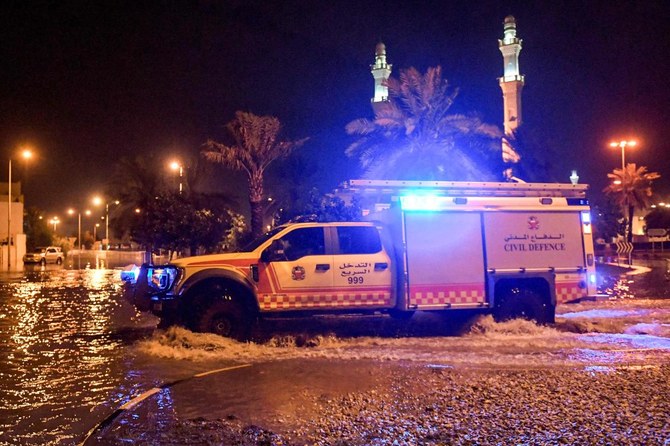
- Lightning flashed across the sky, occasionally touching the tip of the Burj Khalifa, the world's tallest building
DUBAI: Heavy rains lashed the United Arab Emirates on Tuesday, flooding out portions of major highways and leaving vehicles abandoned on roadways across Dubai. Meanwhile, the death toll in separate heavy flooding in neighboring Oman rose to 18 with others still missing as the sultanate prepared for the storm.
The rains began overnight, leaving massive ponds on streets as whipping winds disrupted flights at Dubai International Airport, the world's busiest for international travel and the home of the long-haul carrier Emirates.
Police and emergency personnel drove slowly through the flooded streets, their emergency lights flashing across the darkened morning. Lightning flashed across the sky, occasionally touching the tip of the Burj Khalifa, the world's tallest building.
Schools across the UAE, a federation of seven sheikhdoms, largely shut ahead of the storm and government employees were largely working remotely if able. Many workers stayed home as well, though some ventured out, with the unfortunate stalling out their vehicles in deeper-than-expected water covering some roads.
Authorities sent tanker trucks out into the streets and highways to pump away the water.
Rain is unusual in the UAE, an arid, Arabian Peninsula nation, but occurs periodically during the cooler winter months. Many roads and other areas lack drainage given the lack of regular rainfall, causing flooding.
Initial estimates suggested over 30 millimeters (1 inch) of rain fell over the morning in Dubai, with as much as 128 mm (5 inches) of rain expected throughout the day.
Rain also fell in Bahrain, Qatar and Saudi Arabia.
In neighboring Oman, a sultanate that rests on the eastern edge of the Arabian Peninsula, at least 18 people had been killed in heavy rains in recent days, according to a statement Tuesday from the country's National Committee for Emergency Management. That includes some 10 schoolchildren swept away in a vehicle with an adult, which saw condolences come into the country from rulers across the region.
Iran closed nuclear facilities in wake of Israel attack: IAEA chief
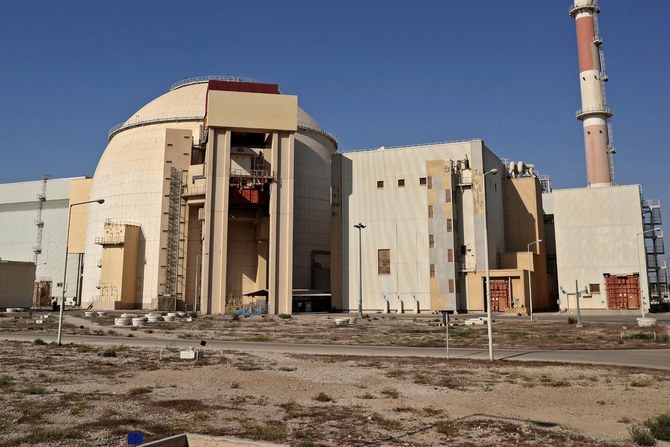
- Israel has carried out operations against nuclear sites in the region before
- Israel accuses Iran of wanting to acquire an atomic bomb, something Tehran denies
United Nations: Iran temporarily closed its nuclear facilities over “security considerations” in the wake of its massive missile and drone attack on Israel over the weekend, the head of the UN’s atomic watchdog said Monday.
Speaking to journalists on the sidelines of a UN Security Council meeting, International Atomic Energy Agency (IAEA) chief Rafael Grossi was asked whether he was concerned about the possibility of an Israeli strike on an Iranian nuclear facility in retaliation for the attack.
“We are always concerned about this possibility. What I can tell you is that our inspectors in Iran were informed by the Iranian government that yesterday (Sunday), all the nuclear facilities that we are inspecting every day would remain closed on security considerations,” he said.
The facilities were to reopen on Monday, Grossi said, but inspectors would not return until the following day.
“I decided to not let the inspectors return until we see that the situation is completely calm,” he added, while calling for “extreme restraint.”
Iran launched more than 300 drones and missiles at Israel overnight from Saturday into Sunday in retaliation for an air strike on a consular building in Damascus that killed seven of its Revolutionary Guards, two of them generals.
Israel and its allies shot down the vast majority of the weapons, and the attack caused only minor damage, but concerns about a potential Israeli reprisal have nevertheless stoked fears of all-out regional war.
Israel has carried out operations against nuclear sites in the region before.
In 1981, it bombed the Osirak nuclear reactor in Saddam Hussein’s Iraq, despite opposition from Washington. And in 2018, it admitted to having launched a top-secret air raid against a reactor in Syria 11 years prior.
Israel is also accused by Tehran of having assassinated two Iranian nuclear physicists in 2010, and of having kidnapped another the previous year.
Also in 2010, a sophisticated cyberattack using the Stuxnet virus, attributed by Tehran to Israel and the United States, led to a series of breakdowns in Iranian centrifuges used for uranium enrichment.
Israel accuses Iran of wanting to acquire an atomic bomb, something Tehran denies.
’No longer a shadow war’: Iran says attack on Israel marks strategic shift
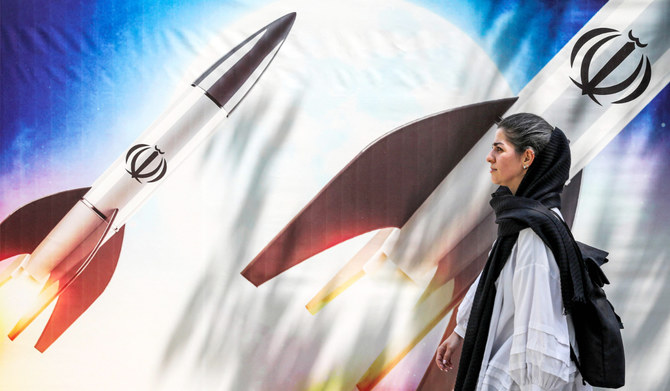
- Israel’s military said it intercepted 99 percent of the aerial threats with the help of the United States and other allies, and that the overnight attack caused only minor damage
- Israel has killed at least 33,797 Palestinians in Gaza, mostly women and children, according to the health ministry in the Hamas-run territory
TEHRAN: Iran’s missile and drone barrage against Israel was the first act of a tough new strategy, Tehran says, warning arch foe Israel that any future attack will spark “a direct and punishing response.”
This spells a dramatic shift from past years in which the Islamic republic and Israel have fought a shadow war of proxy fights and covert operations across the Middle East and sometimes further afield.
Iran from late Saturday launched hundreds of drones and missiles, including from its own territory, directly at Israel, to retaliate for a deadly April 1 strike on Iran’s consulate in Damascus.
Israel’s military said it intercepted 99 percent of the aerial threats with the help of the United States and other allies, and that the overnight attack caused only minor damage.
Iran said it had dealt “heavy blows” to Israel and hailed the operation as “successful.”
“Iran’s victorious... operation means that the era of strategic patience is over,” the Iranian president’s political deputy, Mohammad Jamshidi wrote on X.
“Now the equation has changed. Targeting Iranian personnel and assets by the regime will be met with a direct and punishing response.”
President Ebrahim Raisi said the operation had “opened a new page” and “taught the Zionist enemy (Israel) a lesson.”
Iran said it acted in self-defense after the Damascus strike levelled the consular annexe of its embassy and killed seven members of the Islamic Revolutionary Guard Corps (IRGC), including two generals.
Western governments denounced Iran’s retaliation as “destabilising the region.”
Iran, however, insisted the attack was “limited” and urged Western nations to “appreciate (its) restraint” toward Israel, especially since the outbreak of the Gaza war on October 7.
Regional tensions have soared amid the Israel-Hamas war which has drawn in Iran-backed armed groups in Lebanon, Syria, Iraq and Yemen.
Several IRGC members, including senior commanders, have been killed in recent months in strikes in Syria which Iran has also blamed on Israel.
Since the 1979 Islamic revolution, Iran has frequently called for Israel’s destruction and made support for the Palestinian cause a centerpiece of its foreign policy.
But it had refrained from directly striking Israel until Saturday, an attack on a scale which appeared to catch many in the international community by surprise.
For decades, Iran relied on a network of allied groups to exert its influence in the region and to deter Israel and the United States, according to experts.
A 2020 report by the Washington Institute said that Tehran had adopted a policy of “strategic patience,” which had “served it well since the inception of the Islamic republic in 1979.”
Former moderate president Hassan Rouhani was a staunch defender of the strategy, especially following Washington’s 2018 withdrawal from a landmark nuclear deal, advocating for Tehran not to take immediate countermeasures and taking a longer view.
Even after the 2020 US killing of Qasem Soleimani, an IRGC commander revered in Iran, Tehran gave prior warning to Washington, US sources said, before it launched missiles against two American bases in Iraq, and no soldiers were killed in the attack.
After Saturday’s attack on Israel, Guards chief Hossein Salami also said Iran was “creating a new equation.”
“Should the Zionist regime attack our interests, our assets, our personnel and citizens at any point, we will counterattack it from the Islamic Republic of Iran,” he was quoted as saying by local media.
The attack was also hailed as a “historic” success by Iranian media, with the government-run newspaper Iran saying the offensive “has created a new power equation in the region.”
The ultra-conservative daily Javan said the attack was “an experience Iran needed, to know how to act in future battles” and that it would make Israel “think long before (committing) any crime” against Tehran.
The reformist Ham Mihan newspaper said the attack “ended the status quo and broke the rules of the conflict that pitted the two sides against each other for 20 years and pushed the situation into another phase.”
“This is no longer a shadow war,” it said.




